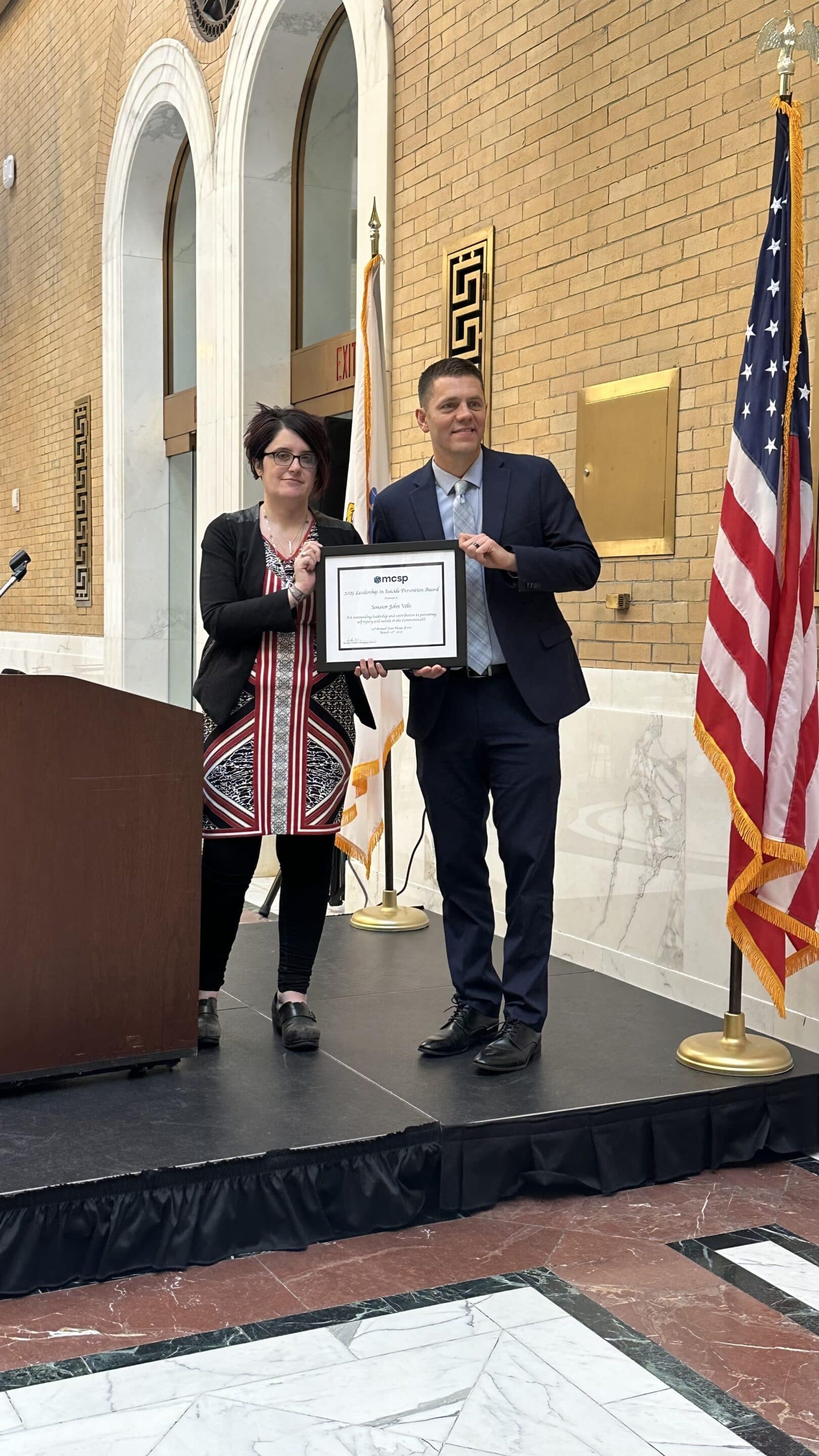State Sen. John Velis thanked the MA Coalition for Suicide Prevention for the recognition of his leadership in suicide prevention during the March ceremony.
Photo credit: Office of Sen. John Velis
In recognition of his work in suicide prevention, state Sen. John Velis received an award for his leadership during a March ceremony at the State House for the Massachusetts Coalition for Suicide Prevention.
The award follows years of dedicated work by the Westfield Democrat to bolster behavioral health resources, including suicide prevention programs, among both the civilian and military-connected populations.
“I am truly honored to receive this recognition for my work in the behavioral space, an issue so near and dear to my heart,” said Velis. “At the end of the day, as we continue to work to bolster access to behavioral health programs it’s imperative that people know that help is out there, and things can and will get better.”
The Massachusetts Coalition for Suicide Prevention is a statewide organization for community activists, healthcare professionals, crisis work and those impacted by suicide. Over the last 20 years, the coalition has been actively working to reduce barriers to mental health, substance addiction recovery, domestic violence shelters and other community services.
“I would also be remiss if I did not acknowledge the hundreds of folks across our state working on the ground each day to form relationships and answer folks when they raise their hands and ask for help. What we do up on Beacon Hill is only one piece of the much larger lifesaving work that is happening every single day in our communities because of these providers and volunteers,” Velis added.
Following reports last summer that showed the Army’s suicide rate in peacetime has now exceeded total combat deaths in the Iraq and Afghanistan wars, Velis hosted a roundtable at Holyoke Community College on how suicide can be prevented among the commonwealth’s service members. After last month’s award ceremony, Velis shared that he will continue to demand a comprehensive response across the nation to address these alarming statistics.
In an interview after receiving the honor, Velis told Reminder Publishing that while he is grateful for the recognition, he wishes there was no need for it.
“This award is such an honor, but I want to be very clear here, this is an award I just wish did not exist,” Velis said. “I wish there was no such thing as suicide. I wish there was help for everyone who was going through things that led them to this.”
Velis said whether it’s active-duty Army personnel or a 14-year-old girl struggling with mental health, his main focus within this work is reducing the barriers in place that hold people back from getting the proper support needed.
“I’ve said this before, the three hardest words for any human being to say are also the three most courageous words that any human being can say, which is ‘I need help,’” Velis said. “One of the fascinating things about this mental health crisis right now, it quite literally is from the cradle to the grave. We’re seeing upticks in numbers across the board, all demographics, all races, all everything. So, when that person says, ‘I need help,’ we need to reduce barriers.”
Reducing barriers means meeting people where they are and eliminating many such instances of someone reaching out for support, but being told they cannot get an appointment in a timely manner, according to Velis. It also means expanding the behavioral health workforce, something Velis said he is focused on addressing in a meaningful way.
“We’ve got a really big problem in Massachusetts where folks who are in this space, like psychiatry, psychology, whether you’re a nurse, a PA, a CNA, a social worker — the pay just isn’t good,” Velis said. “What that looks like is a state like Massachusetts, when the reimbursement rates are so low, and housing is so expensive and all these other things are expensive, they go to other places.”
Velis said often those seeking assistance are told there is a “bed crisis” or a limited number of spots available for a client, when more accurately the issue is more related to these organizations and services being understaffed with support. Because of this, Velis said he is still focused on encouraging the expansion of the behavioral health trust fund going forward, an allocation of state money to give people funds to go into behavioral health work.
In December, the Healey-Driscoll administration announced the issuing of $12.4 million through the Behavioral Health Trust Fund to 37 colleges and universities to financially support behavioral health students completing unpaid internships and field placements. The grants are for undergraduate and graduate-level students pursuing careers treating mental health or substance use disorders and are part of the state’s efforts to grow a culturally and linguistically diverse behavioral health workforce in Massachusetts.
“The number of people that have tried to get help, whether it’s mental health, substance use or anything, where they pick up the phone and they’re told, ‘we got you an appointment six months from now,’ or, ‘you know what, call us back in two weeks.’ That is the wrong answer, because far too often those people have then said, ‘OK, I came forward. I had the courage to say those three words, I need help, and I was told I have an appointment in six months.’ And quite frankly they say to themselves, ‘nobody cares.’”
Another priority for Velis in the next legislative session is continuing to keep communication open and honest about the struggles of mental health and the crossover of addiction.
“The easiest thing that we can do is arguably the most important: to talk about it openly and really talk about our struggles because stigma, in this field in particular, is really, really, really bad. A lot of times, people of all ages — I’ve talked to them. They’re going through a lot of things in their mind and they’re just not willing to talk about it because they’re afraid how people are going to make them feel if they talk about it. We need to raise our hand and say, ‘Look, you’re not alone.’”
Velis continued, “I don’t care what it is, but everyone is suffering from some type of mild-grade depression, anxiety. We’ve got to talk about it. There’s an overlap, a really big correlation between behavioral health and substance abuse disorders. I’ve been very open about my struggles with addiction. I just celebrated eight years of sobriety, and I talk about it and talk about it a lot because I want people to know, ‘here’s a guy who was on a path towards death. Thinking all types of crazy things in his mind, doing all types of stupid things, but he got help.’ I want to talk about it and I want people to know that there’s help out there and let people know again, it’s OK, you’re not the only one.”
Looking ahead to the continued battle against mental health barriers, Velis said his priorities are to continue breaking down stigmas, finding ways to influx more professional staff in the field and keep open communication with the public about mental health and how people can get help.
“It’s really continuing to push back both in the civilian context, and the military context, on the stigma of this and the main way we do that is we talk about it,” Velis said. “Obviously I’m so honored and humbled to be the chair of mental health substance use and recovery. I made it very clear to the Senate president [that] this is the committee I want to chair. Behavior health, mental health, is the biggest challenge we don’t spend enough talking about in this commonwealth. I’m going to continue to raise this issue and elevate this issue so it gets the due thought process, respect and understanding that it so obviously deserves this coming session.”


